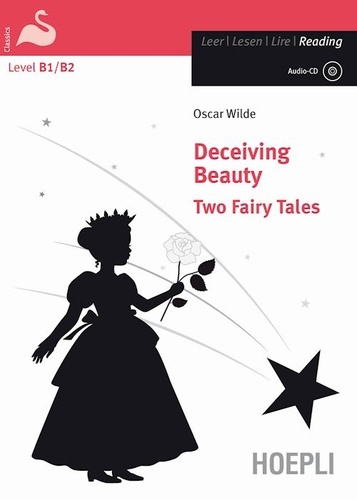Deceiving Beauty - B1/B2
Two Fairy Tales

Editorial Hoepli
Colección Leggere, Número 0
Lugar de edición
Milano, Italia
Fecha de edición mayo 2013 · Edición nº 1
Idioma inglés
EAN 9788820356491
106 páginas
Libro
encuadernado en tapa blanda
Dimensiones 150 mm x 210 mm
Resumen del libro
The two stories in this volume deal with the complexity between inner and outer beauty by portraying beauty as both the cause of moral degradation and a reward for moral virtues. The Birthday of the Infanta is one of Oscar Wilde's fantastic and truly meaningful fairytales written for adults rather than for children. The short story is about a hunchbacked dwarf found in the woods and brought to the palace for the amusement of the Infanta, on her twelfth birthday. She very much enjoys the many festivities arranged in her honour, especially the dwarf's performance where he dances as he usually does in the woods, unaware that his audience is laughing at him. In The Star Child, a star falls from the winter sky into a wood, and there two shepherds find a strange infant. Though exquisitely beautiful of face and form, the Star-Child turns out to be a cruel and selfish boy. This volume (accompanied by an Audio-CD) offers the opportunity to enjoy an original text while learning at the same time. All the activities aim to integrate the various language skills. A final section is dedicated to Wilde's Aesthetic Views.
Biografía del autor
Novelista, poeta, crítico literario y autor teatral de origen irlandés, gran exponente del esteticismo, Oscar Wilde conoció el éxito desde sus comienzos gracias al ingenio punzante y epigramático que derrochó en sus obras, dedicadas casi siempre a fustigar a sus contemporáneos. Defensor del arte por el arte, sus relatos repletos de diálogos vivos y cargados de ironía provocaron feroces críticas de los sectores conservadores, que se acentuaron cuando Wilde fue acusado y condenado por su homosexualidad, lo que originó el declive de su carrera literaria y de su vida personal. Entre sus obras destacan las cuatro comedias teatrales El abanico de lady Windermere (1892), Una mujer sin importancia (1893), Un marido ideal (1895) y La importancia de llamarse Ernesto (1895), El fantasma de Canterville o El retrato de Dorian Gray, su única novela.








